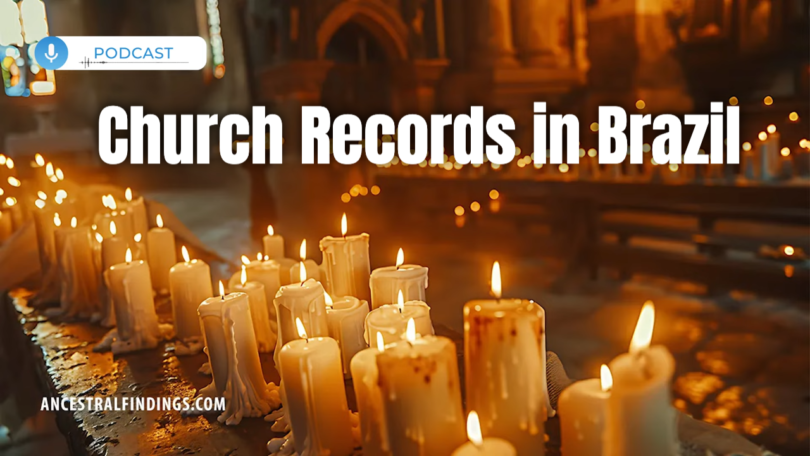Picture this: you’re holding an old, weathered piece of paper. The ink is slightly faded, but the words are still legible. It’s a baptismal record from a small church in Brazil, dated over a hundred years ago. As you read the names, dates, and locations, you realize that you’re not just looking at a document—you’re holding a piece of your family’s history, a tangible connection to your ancestors.
Catholic Church records in Brazil are like treasure chests, brimming with information that can unlock the mysteries of your family’s past. These records, including baptisms, marriages, and burials, are some of Brazil’s oldest and most reliable sources for genealogical research. But where do you start? Let’s explore the fascinating world of Brazilian church records and how they can help you trace your roots.
The Heart of Brazilian Genealogy: Catholic Church Records
In Brazil, the Catholic Church was not just a place of worship but the center of community life. From the colonial period well into the 20th century, the Church kept meticulous records of the significant events in the lives of its parishioners. These records are invaluable for genealogists because they often contain detailed information that you won’t find anywhere else.
Imagine discovering the exact date and place where your great-grandparents were married or finding out the names of ancestors you never knew existed. Church records can provide this and more, offering a glimpse into the lives of your forebears in ways that civil records sometimes can’t.
Baptisms: The Starting Point for Many Genealogists
Baptismal records are often the first stop for genealogists researching Brazilian ancestors. These records typically include the name of the child, the date of baptism, the names of the parents, and sometimes even the names of the godparents. In a time when civil registrations were scarce or non-existent, baptismal records were often the only official documentation of a person’s birth.
But it’s not just about names and dates. These records can also reveal fascinating details about your ancestors’ lives. For example, the choice of godparents might tell you about the family’s social connections, while the location of the baptism can give you clues about where the family lived and how they moved over time.
Marriages: Uniting Families and Clans
Marriage records are another goldmine for genealogical research. These documents usually list the names of the bride and groom, their parents, and the witnesses. They often include the ages of the couple, their places of birth, and their current residences.
What makes marriage records particularly valuable is their ability to link families. By examining these records, you can trace how different branches of your family tree are connected. Perhaps your ancestors were part of a small community where everyone was related by marriage, or maybe they married into a prominent local family. These connections can help you build a more complete picture of your family’s history.
Burials: Honoring the Departed
While burial records may seem somber, they are essential for genealogists. These records provide information about the deceased, including their age at death, the date of burial, and sometimes the cause of death. In many cases, they also list the names of surviving family members, offering clues for further research.
Burial records can be particularly useful when other records are missing or incomplete. For example, if you can’t find a birth or marriage record, a burial record might provide the key details you need to continue your search.
Where to Find These Records: A Researcher’s Guide
Now that you know what you’re looking for, the next question is: where do you find these records? The good news is that many Catholic Church records in Brazil have been preserved and are accessible to researchers.
- Parish Archives
The most direct source for church records is the parish itself. Many parishes have kept their records in local archives, some of which date back to the 16th century. If you know the specific parish where your ancestors lived, contacting the parish directly can yield valuable results.
- Diocesan Archives
For a broader search, diocesan archives are another excellent resource. These archives typically hold records from multiple parishes within a diocese, making them a great option if you’re unsure of the exact parish.
- FamilySearch
FamilySearch, a free genealogy website, has digitized many Brazilian church records. You can search by location, date, and type of record, making it easier to find what you need without leaving your home.
- Arquivo Nacional (National Archives)
The National Archives of Brazil also hold a wealth of church records, especially from the colonial period. These records have been digitized and can be accessed online or in person.
Tips for Successful Research
Researching church records in Brazil can be a rewarding experience, but it can also be challenging. Here are a few tips to help you navigate the process:
• Be Patient: Church records are often handwritten and in old Portuguese, which can be difficult to read. Take your time to carefully decipher the information.
• Know the Geography: Understanding the historical geography of Brazil can help you locate the right parish. Boundaries and names of places may have changed over time, so familiarize yourself with the region’s history.
• Start with What You Know: Begin with the information you already have, such as names, dates, and locations, and use that as a foundation to build upon.
• Keep an Open Mind: Records may not always be where you expect them to be. Be prepared to explore neighboring parishes or dioceses if you don’t find what you’re looking for right away.Bringing Your Family’s Story to Life
Catholic Church records in Brazil are more than just documents; they’re stories waiting to be told. By piecing together the information in these records, you can bring your ancestors’ lives into focus, understanding not just the dates and places but the people, relationships, and communities that shaped who they were.
Whether you’re discovering a baptismal record from a tiny rural parish or a marriage certificate from a bustling urban church, each piece of information adds another layer to the rich tapestry of your family history. As you explore these records, you’re not just learning about the past—you’re connecting with it in a deeply personal way.
So, dive in, explore the archives, and see where the journey takes you. You never know what fascinating stories you might uncover in the pages of Brazil’s Catholic Church records.
Read More:
- Slavery Unseen: Sex, Power, and Violence in Brazilian History (Latin America Otherwise)
- The History of Brazil, 1500–1627 (Classic Histories from the Portuguese-speaking World)
- History of Brazil: A Captivating Guide to Brazilian History, Starting from the Ancient Marajoara Civilization through Colonization by the Portuguese Empire to the Present (South American Countries)
- Immerse Yourself in the Compelling Narrative of Brazil: From the Enigmatic Marajoara Civilization to Society of Today
- American Mirror: The United States and Brazil in the Age of Emancipation (America in the World)







